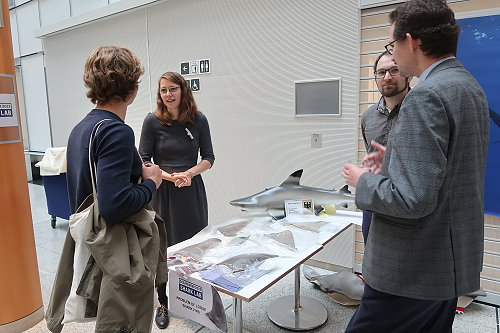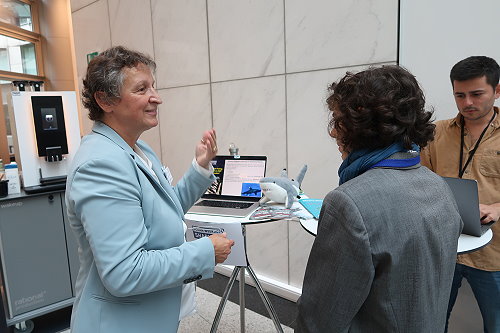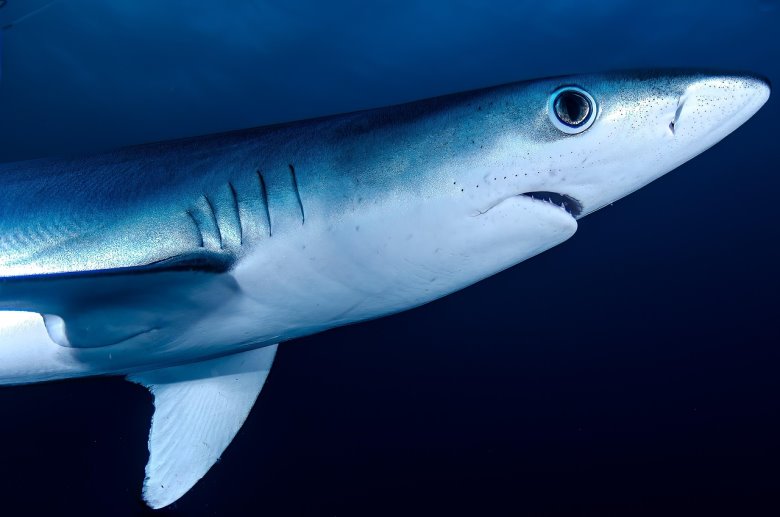
Explanations and display of fins mostly from endangered shark species confiscated at Frankfurt Airport. The diversity of fins in container shipments clearly shows that it is impossible for customs officers to check the mass shipments competently. The trade in shark fins should be prohibited to curb the massive fraud and better protect the vulnerable and endangered species. More than 1 million European citizens demanded that in a petition in 2022. See here the link to the hearing in the European Parliament in March 2023.
Healthy oceans are a core requirement for growing a sustainable blue economy. For this, a thriving biodiversity is of utmost importance and needs to be a priority for all of us, protecting livelihoods for this and future generations. As keystone species, sharks play a critical role in ocean health and resilient ecosystems, in combating climate change, and ensuring food security from healthy oceans.
The sad fact is, however, that sharks have become the second most threatened vertebrate group after amphibians. The biomass of some species has declined by over 90% in the last 50 years. Preventing the loss of healthy shark populations and their ecosystem services matters to everyone on this planet, whether living in a coastal state or one without direct access to the ocean.
The Shark Lab invited Members of Parliament and EU policymakers participating in the Ocean Week to come together during a 2-hour event, on 15 October 2025 from 14 to 16h, to share ideas, answer questions, and raise the collective awareness of the existential threats impacting global shark populations, and therefore the health of our ocean and our blue planet.

Dr. Iris Ziegler of Deutsche Stiftung Meeresschutz explains the ins and outs of how to protect sharks effectively.
The event featured a series of tabletop discussions focusing on various threats to shark populations, common misconceptions, and possible solutions we can jointly prioritise. Participants were invited to join the conversation, learn and share experiences, and help us design the best pathways to strategic action.
European shark consumption is on the rise, especially in Spain and Portugal. But most people may still be unaware that the concentrations of methyl mercury, which is particularly toxic for the brain and nervous system, tend to be high in top predators, such as sharks, so that safety limits identified by European health authorities can be exceeded. That’s bad news particularly for women in child bearing age and their developing offspring.
A Mundus maris member, while working at the FAO, had already spearheaded a pilot study on the probability of Italian seafood consumers exceeding recommended levels of mercury, published in 1982. See pdf here.
Leaving the sharks alone to fulfill their essential role in productive marine ecosystems makes good sense for restoring biodiversity, cope better with climate change through healthy natural systems, and secure good seafood into the future. Keep that in mind when paying particular attention to protect endangered sharks which are bycatch or even targeted by European fisheries.
Critically endangered species in the Mediterranean are – click on the link to get summary species page and pictures in FishBase
- Blue shark (Prionace glauca),
- Shortfin mako (Isurus oxyrhinchus),
- Gulper shark (Centrolosus granulosus)
and in the Northeast Atlantic
- Porbeagle shark (Lamna nasus),
- Spiny dogfish (Squalus acanthias),
- Tope shark (Galeorhinus galeus), and
- Common or Blue skate (Dipturus batis).

Blue shark by RuiPAOliveira on Pixabay
The Shark Lab was organised by Seas At Risk and member organisations, Stop Finning Deutschland e.V., Elasmocean, Sharkproject, Shark Guardian, Deutsche Stiftung Meeresschutz, Irish Wildlife Trust, and Sciaena.
The event was sponsored by MEP Manuela Ripa (EPP, Vice-chair, Welfare and Conservation of Animals Intergroup and member of the ENVI Committee). She opened the event with a keynote address.
